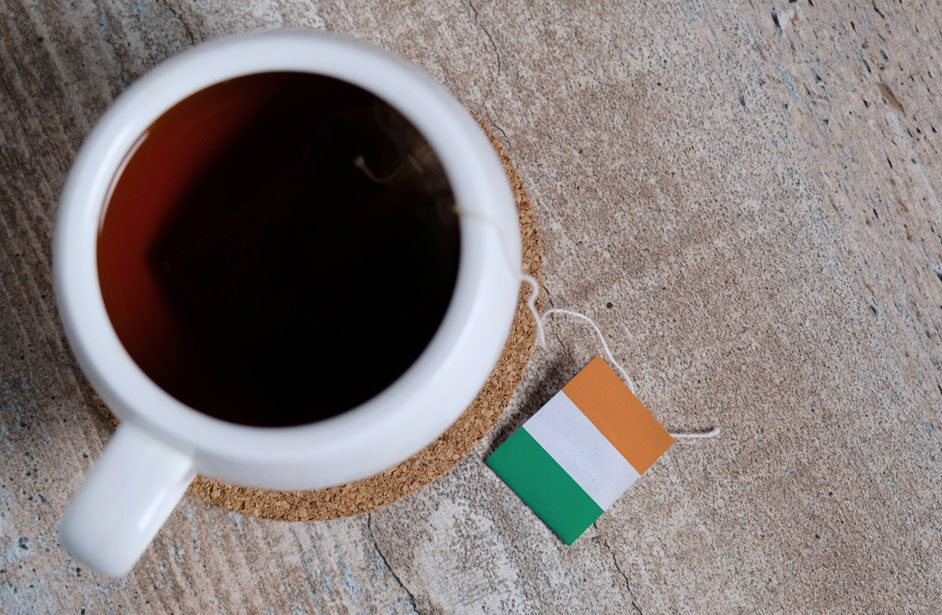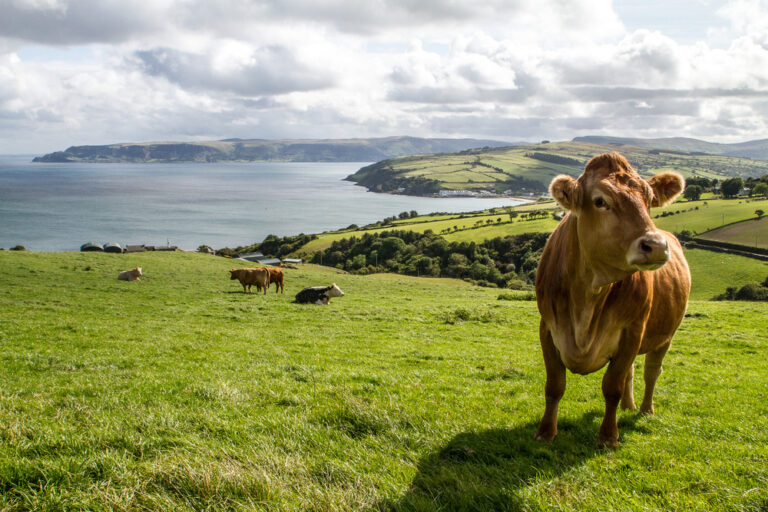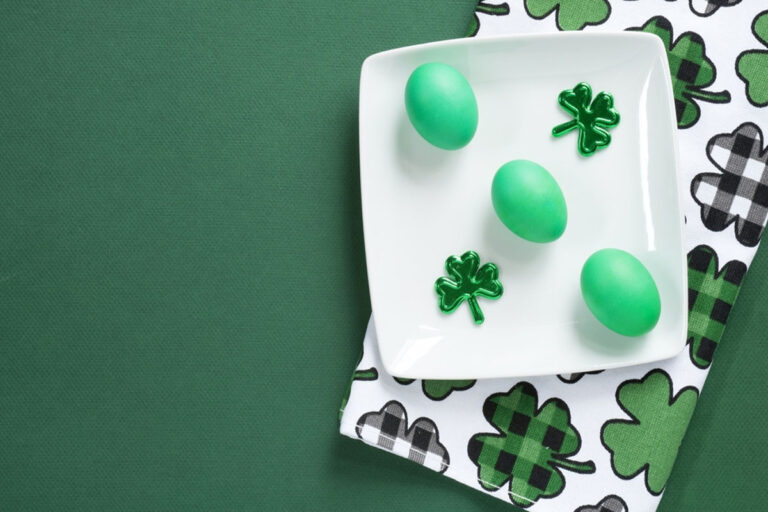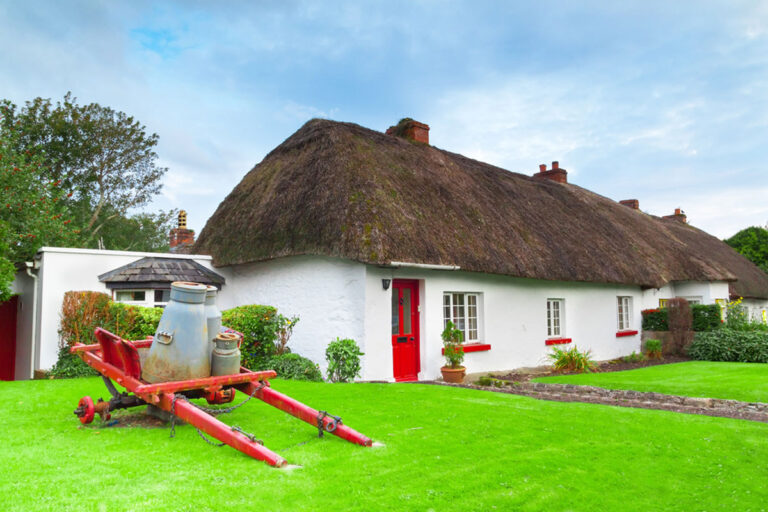An overview of Irish tea
Irish tea is a variety of black tea cultivated and produced in a number of countries, but is most strongly identified with Ireland. The tea is often prepared from a combination of Assam and Kenyan teas, giving it a powerful, robust flavor that is popular both in Ireland and beyond.
The history of Irish tea can be traced back to the early 1800s when the British began importing tea to Ireland. At the time, tea was considered a luxury item and was only consumed by the wealthy. However, by the mid-1800s, tea had become more widely available and was being consumed by people of all social classes.
Today, Irish tea is an important part of Irish culture, and people of all ages and backgrounds enjoy it. It is usually served with milk and sugar, and it is frequently accompanied by biscuits or scones. In Ireland, the tea break is a typical ritual that involves taking a break from work or other activities to drink a cup of tea with friends or coworkers.
Irish tea has grown in popularity around the world, notably in nations with substantial Irish populations such as the United States, Canada, and Australia. Irish tea is frequently sold in these nations as a means to connect with Irish heritage and culture.
Overall, Irish tea has a long history and cultural importance, making it a popular beverage in Ireland and across the world. Its powerful, robust flavor, as well as its affiliation with Irish traditions and rituals, have made it a favorite choice among tea drinkers worldwide.
Irish Tea Varieties
Irish tea comes in a number of sorts and styles, ranging from loose leaf tea to tea bags. Barry’s Tea, Bewley’s Tea, and Lyons Tea are three of the most popular brands of Irish tea, each having its own distinct mix and flavor.
Loose leaf tea is a classic type of Irish tea that is typically regarded as the best. It is recognized for its rich flavor and aroma and is created by steeping entire tea leaves in hot water. Loose-leaf tea is often supplied in tins or canisters and is more costly than tea bags.
Tea bags, on the other hand, are a quick and practical method to enjoy Irish tea. They’re usually prepared with lower-quality tea leaves and offered in boxes or individually packaged sachets. For those who like a quick and simple cup of tea, tea bags are a popular alternative.
Barry’s Tea is a prominent Irish tea brand recognized for its powerful and robust flavor. Gold Blend, Classic Blend, and Irish Morning Blend are among the blends available from the brand. Each blend is created with a unique flavor profile by combining Assam and Kenyan teas.
Bewley’s Tea is another well-known Irish tea brand that is noted for its exceptional quality and flavor. Dublin Morning, Irish Afternoon, and Irish Breakfast are among the mixes available from the brand. Bewley’s also sells loose leaf tea and other tea-related items.
Lyons Tea, a third popular Irish tea brand, is known for its smooth and mellow flavor. Original, gold blend, and decaffeinated mixes are available from the firm. Lyons Tea is available in tea bags as well as loose leaf tea.
In general, the variations between various brands and mixes of Irish tea come down to the sorts of tea leaves used, the quality of those leaves, and the precise blend or recipe employed by the tea manufacturer. Each brand has a distinct flavor profile and a devoted following among tea consumers.
How to Make Irish Tea
Making the ideal cup of Irish tea takes a few crucial processes and skills. Here are some tips and strategies for brewing the ideal cup:
- Start with fresh, cold water. The quality of the water you use might alter the taste of your tea. Start with fresh, cold water, and avoid using distilled or severely chlorinated water.
- Select the proper tea: Choose a high-quality Irish tea that suits your preferences. You can try many mixtures and brands to discover your favorite.
- Bring the water to the proper temperature. Bring the water to a boil, then set aside for a minute or two before pouring it over the tea. 212°F (100°C) is the recommended temperature for brewing Irish tea.
- Use the proper tea-to-water ratio. Use one tea bag or one teaspoon of loose leaf tea per cup of water to make a strong cup of Irish tea. Use less tea for a softer taste.
- Steep for the appropriate amount of time: Irish tea should be steeped for between 3 and 5 minutes. Too much steeping time might result in a harsh taste, while too little steeping time can result in a faint flavor.
- To taste, add milk and sugar. Tea is traditionally served with milk and sugar in Ireland. After steeping the tea, add these to taste. Some people prefer to add milk and sugar before steeping, although this might disrupt the process and change the flavor.
- Serve hot: Irish tea is best savored hot, so serve it right away.
Aside from these suggestions, there are a few other things you can do to improve the flavor of your Irish tea. You can, for example, experiment with different types of milk (such as almond or oat milk) or sweeteners (such as honey or agave nectar). For a classic Irish touch, serve your tea with a slice of lemon or a biscuit.
Finally, producing the ideal cup of Irish tea comes down to finding the appropriate combination of ingredients and steeping time. You can make a great and gratifying cup of tea for any occasion with a little experience and trial.
Irish tea customs
Tea has been a mainstay of Irish life for generations and plays an important role in Irish culture and traditions. Tea is a valued ritual in Ireland that brings people together and gives comfort and warmth, from the morning mug to the afternoon tea break.
The tea break is one of the most well-known Irish tea customs. Workers in Ireland used to take a few minutes every day to have a cup of tea and a snack. This custom is still alive and well today, with many Irish workplaces providing tea breaks to their staff.
Afternoon tea is another popular tea custom in Ireland. This is a more formal occasion that is generally enjoyed in tea rooms or hotels and includes a selection of sandwiches, scones, and pastries as well as a pot of tea. Afternoon tea is a favorite pastime for special events such as birthdays, weddings, and holidays since it allows you to indulge in a little luxury while still enjoying excellent company.
In addition to these official tea traditions, Ireland has a plethora of additional tea-related practices. It is customary to offer guests a cup of tea when they visit your home, and many Irish families have a teapot on the go throughout the day.
There are several traditional Irish recipes for tea treats to try. Scones are a traditional breakfast item that are often served warm with butter, jam, and whipped cream. Another popular alternative is barmbrack, a sort of fruit bread that is commonly served with a cup of tea during Halloween.
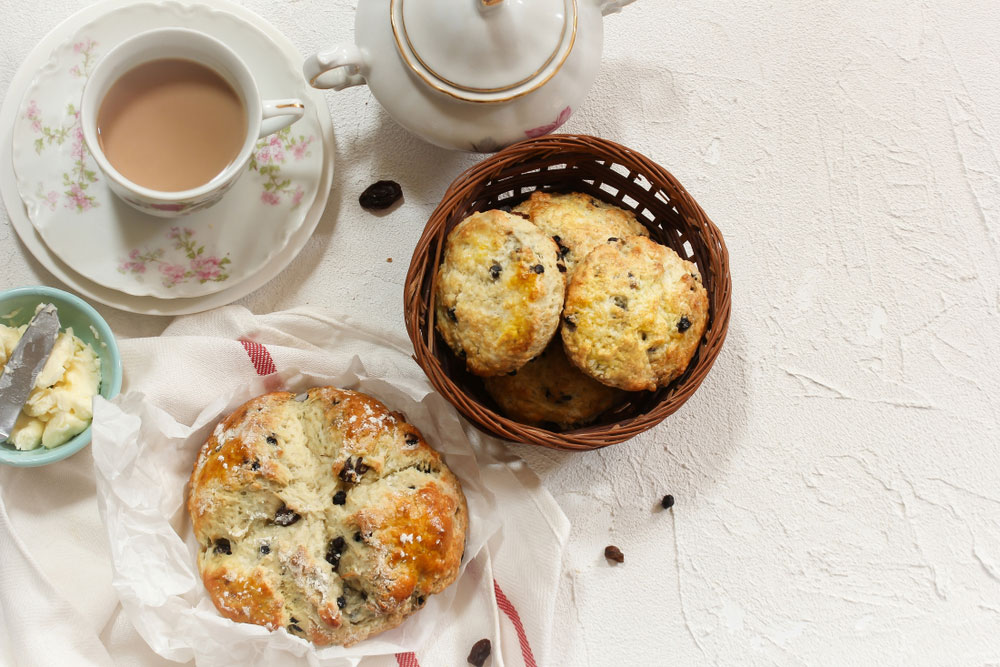
Irish Tea Health Benefits
Irish tea, like other forms of tea, is said to provide a variety of health advantages. Tea’s key health-promoting ingredients are antioxidants, which help protect the body from free radical damage. Tea also includes beneficial components such polyphenols, catechins, and flavonoids, which have been linked to a variety of health advantages.
The influence of Irish tea on heart health is one possible advantage. According to research, drinking tea on a daily basis may help lower blood pressure, lower LDL (or “bad”) cholesterol levels, and enhance overall cardiovascular health. This is most likely due to tea’s strong antioxidant content, which can help decrease inflammation and increase blood flow.
Tea has also been demonstrated to offer possible digestive advantages. Tea, in particular, may help to decrease inflammation in the digestive system, which may help to improve symptoms of illnesses such as IBS and inflammatory bowel disease (IBD). Tea’s caffeine component can also assist accelerate bowel movements and relieve constipation.
In addition to these potential benefits, tea has also been linked to improved cognitive function, including better memory and concentration. The caffeine content in tea can help to improve alertness and mental clarity, while the antioxidants in tea may help to protect brain cells from damage.
It’s worth mentioning that, while Irish tea may have certain health advantages, they are most likely to be seen when drank in moderation as part of a healthy diet and lifestyle. Furthermore, many of the health benefits of tea are thought to be derived from antioxidants and other beneficial compounds found in tea leaves rather than from additives such as milk or sugar.
Overall, Irish tea can be a tasty and healthy beverage option for those looking to improve their overall health. Whether you choose a robust cup of Barry’s Tea or a softer cup of Lyons Tea, integrating tea into your daily routine may provide a number of health advantages for your heart, stomach, brain, and other organs.
Irish tea and the environment
The Irish tea business, like many agricultural sectors, has the potential to have a large environmental impact. Tea production may consume a lot of water, energy, and other resources, and the use of pesticides and other chemicals can harm soil health and biodiversity.
However, the Irish tea industry is making numerous efforts to reduce its environmental impact and promote sustainability. Some tea companies, for example, are working to reduce their water and energy consumption through more efficient manufacturing processes and the use of renewable energy sources. Others are investigating alternative pest management strategies, such as the use of natural predators, in order to limit the usage of chemical pesticides.
In addition to these initiatives, there are several ethical and fair trade aspects in the Irish tea sector. Many tea workers in impoverished nations, where much of the world’s tea is cultivated, may be paid poorly and work in unsanitary circumstances. Some tea companies are addressing these issues through fair trade certification programs, which ensure that tea workers are fairly compensated and work in safe and healthy environments.
Furthermore, some Irish tea companies are emphasizing sustainability and ethics in their supply chains. Some companies, for example, are working to source their tea leaves from organic and/or Rainforest Alliance-certified farms in order to promote environmental sustainability and social responsibility.
It’s worth noting that as customers, we can help promote sustainability and ethical issues in the Irish tea sector. We can help promote a more sustainable and ethical tea business for years to come by choosing tea companies that stress sustainability and fair trade standards and by being conscious of our own consumption patterns.
Irish Tea All Around the Globe
Irish tea has acquired popularity in nations other than Ireland, including the United States, Canada, Australia, and the United Kingdom. Irish tea is frequently offered in these nations as a high-quality, tasty alternative to other forms of tea.
Barry’s Tea is one of the most popular Irish tea brands in the United States, with a devoted following among tea enthusiasts. Barry’s Tea is frequently advertised as a premium tea brand and may be found at specialized tea stores as well as online sellers.
Irish tea is also popular in Canada, with brands such as Barry’s Tea and Bewley’s Tea widely accessible in supermarkets and specialized food stores. Lyons Tea and Barry’s Tea are popular alternatives in Australia, with Lyons Tea being particularly well-known for its strong, powerful flavor.
The addition of milk and sugar to Irish tea is a distinctive twist that has gained appeal in several nations. While Irish tea is traditionally consumed without any additives, in some countries, milk and sugar are commonly added to make a sweeter, creamier cup of tea.
Furthermore, some tea shops and cafes in the United States and elsewhere have begun to offer Irish tea lattes and other specialty tea drinks made with Irish tea.
Overall, the popularity of Irish tea outside of Ireland attests to the beverage’s quality and flavor. Irish tea is a beverage that has won the hearts of tea enthusiasts all over the world, whether savored with a scone and a dab of jam in a snug Irish tea parlor or drank on the move in a bustling city.
The Irish Tea Industry’s Future
The Irish tea business has a long and rich history, and as the globe changes, the tea industry must adapt as well. The increased interest in speciality teas, such as herbal teas and teas with health benefits, has been one of the most significant changes in tea consumption in recent years. As a result, Irish tea firms may need to diversify and differentiate their product ranges.
Another tea consumption trend that will have an influence on the Irish tea sector is the growing desire for ethically sourced and sustainable tea products. There is an increasing demand for tea that is grown in a socially and ecologically responsible manner as customers become more conscious of the impact of their shopping decisions. To suit changing customer expectations, Irish tea producers may need to invest in more ecological and ethical sourcing procedures, such as obtaining tea from certified organic or fair trade farms.
Aside from these trends, the continued expansion of e-commerce and online shopping may have an impact on the Irish tea industry. As more people purchase online, Irish tea producers may need to change their marketing and distribution tactics to reach out to customers in new ways.
Overall, changing consumer preferences and trends, technical improvements, and rising concerns about sustainability and ethical sourcing are expected to impact the future of the Irish tea sector. As the business evolves, Irish tea producers will need to be inventive and adaptive in order to remain competitive and suit the requirements of tea enthusiasts worldwide.
